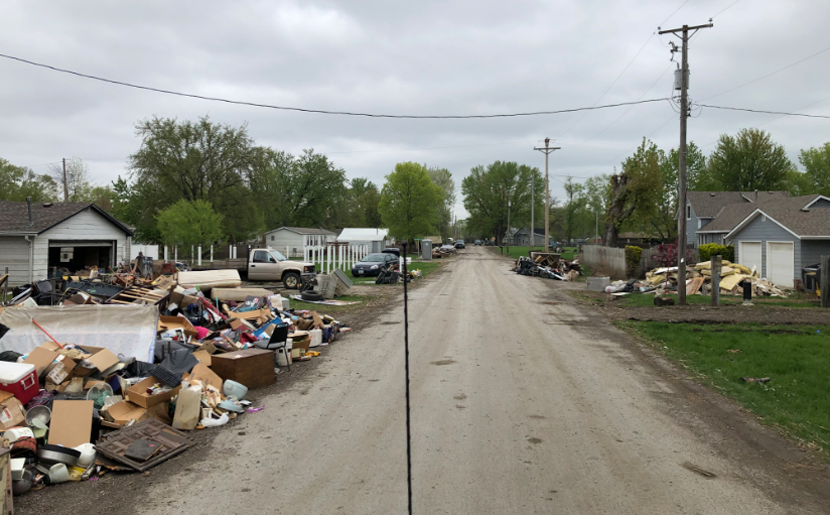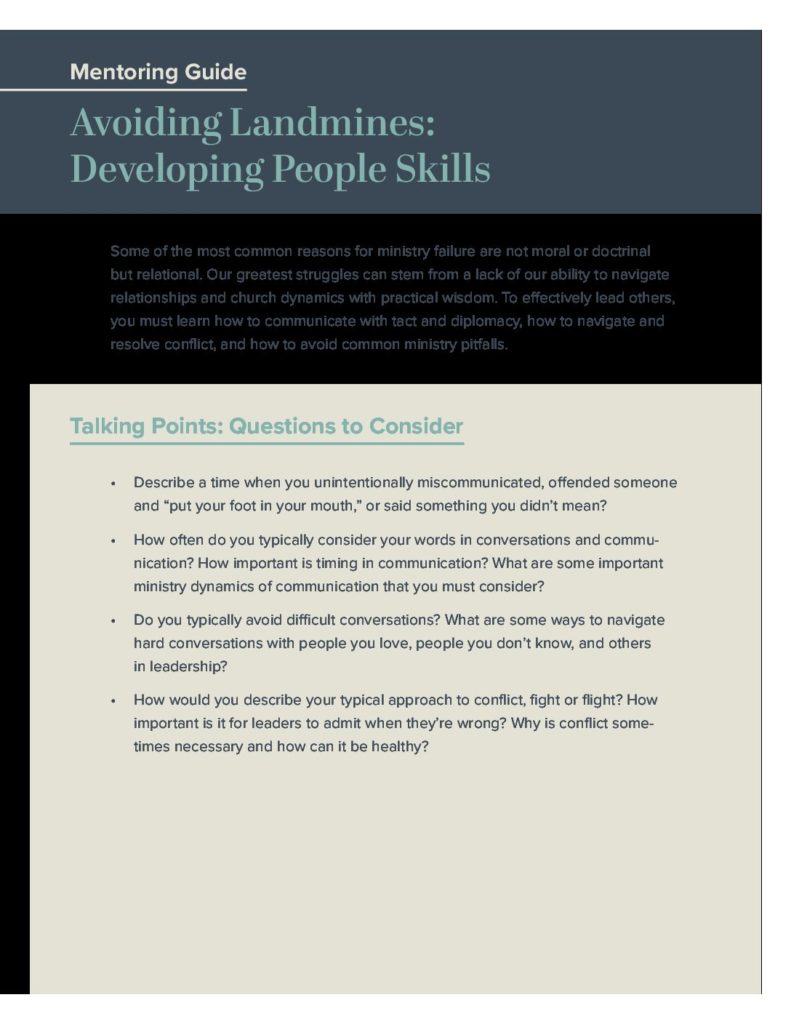By Tobin Perry

Pacific Junction, Iowa, located 25 miles South of Omaha, Neb., on Interstate 29, was hit hard by recent flooding. Southern Baptist Disaster Relief leaders say more volunteers are needed to make headway on relief efforts before summer heat brings more complications. Photo by Nick Burt, Arkansas Baptist State Convention.
DAVENPORT, Iowa (BP) — Five weeks after historic flooding hit the Midwest, Southern Baptist Disaster Relief (SBDR) volunteers are working their way through more than 1,400 mud-out requests for homes devastated during the disaster. With tornado season looming and increased volunteer needs anticipated nationwide, SBDR leaders are asking Southern Baptists to consider opportunities to aid flood relief efforts in Nebraska and Iowa.
Sam Porter, national director for SBDR at the North American Mission Board (NAMB), says the timing is critical to saving homes in the impacted region.
“Even if they’re not a part of SBDR, if a church has an organized group or they have some leadership that was a part of disaster relief, I know Kansas, Nebraska and Iowa would welcome them to go up and help us mud out and clean the homes,” Porter said. “When it warms, the homes will be consumed by mold, and they’ll have to destroy the whole house. It’s really urgent to get in and take all of that out of there as soon as we can.”
The devastating floods started in late March after heavy rain and melting snow led to floodwaters 10-feet high in places. Flood conditions continued throughout April. Earlier this week, The New York Times reported the Mississippi River has been above major flood stage around Davenport, Iowa, for a record 39 days this spring.
Farmers have been hit particularly hard by the flooding. In March alone, more than 1 million acres of cropland were ravaged by floods, according to a Reuters report.
Southern Baptists responded immediately to the flooding with multiple state conventions sending teams to help. Porter estimates that Southern Baptists representing 10 to 12 states have participated in the recovery efforts. He says SBDR needs a strong push in the next four weeks to complete as many of the remaining jobs as possible before summer hits.
“The Cooperative Program for Southern Baptists is about more than just money,” said Porter, who served for 19 years as the director of disaster relief in Oklahoma before becoming the SBDR national director. “It’s manifested probably the best in Southern Baptist Disaster Relief, where we go to help each other and will stay as long as we’re needed, even when we’re hurting in our own states.”
Currently, SBDR’s ministry to flood survivors is based out of churches in Freemont, Neb., Bellevue, Neb., and Glenwood, Iowa.
Randy Garrett serves as the director of disaster relief for Arkansas Baptists and has been overseeing the Midwest flood work for Southern Baptists. He noted that while trained volunteers are greatly appreciated, anyone is welcome regardless of previous training.
“We can train people through video and on-the-job training,” Garrett said. “We’ll provide volunteers with all the safety equipment they’ll need.”
Garrett said that past experience shows that the number of volunteers declines the further it has been since the disaster. With tornadoes hitting multiple southern states, including Louisiana, Oklahoma, and Arkansas, he wants to remind Southern Baptists of the needs in the Midwest.
Louisiana Baptists responded to a powerful F3 tornado on April 25 that hit the north-central Louisiana town of Ruston. The tornado killed two people and left heavy damage on the campus of Louisiana Tech University. Last Saturday, about 1,300 Louisiana Tech students volunteered to help with cleanup efforts. Louisiana Baptists and several other organizations helped manage the student efforts.
Porter attended a worship service at Temple Baptist Church in Ruston where several people shared testimonies about how Southern Baptists had been there to help in their time of need.
Garrett emphasized that the SBDR efforts are all built on the foundation of sharing the hope of Jesus in the midst of disaster.
“We’ve seen a tremendous outpouring of people giving their faith to Christ,” Garrett said. “We have some people who have been unbelievable in evangelism and sharing the Word of Christ. It goes hand in hand. We don’t just go into places to fix things. We go there to share Christ.”
For more information about how you or your church can help flood survivors in the Midwest through SBDR, visit NAMB’s directory of state Baptist convention websites here.
Tobin Perry writes for the North American Mission Board.
MASHALLTOWN, Iowa (BP) — Southern Baptist Disaster Relief teams have begun cleanup work in Marshalltown, Iowa, following a devastating tornado July 19.
A Missouri Baptist Disaster Relief team arrived Tuesday to set up incident command at Iglesia Karios in Marshalltown. Chainsaw teams from Iowa have dispersed throughout the city to clear debris. An SBDR feeding team has prepared meals for recovery workers in the area.
Additional SBDR volunteers from Kansas-Nebraska and Florida already are on the ground in Marshalltown. Carlson, co-director of Iowa Baptist Disaster Relief, expects volunteers from other nearby states to arrive later this week and early next week. Teams from other states interested in providing assistance should contact their state disaster relief director.
“It looks like a war zone to tell you the truth,” Carlson said. “When you go downtown, you’ll see a lot of glass and brick everywhere.
“On the east part of town, there are about 10 blocks that are very heavily hit. There’s really not many trees standing. A lot of those homes aren’t livable,” Carlson said.
The EF-3 tornado injured at least 235 people in the town of 27,000 located 50 miles northeast of Des Moines. Carlson estimates that at least 100 homes were destroyed. Many more homes will take substantial work before people can return to live in them. Carlson believes it will take months, if not years, for Marshalltown to rebuild.
Some of the worst damage in Marshalltown came to the town’s courthouse and the brick buildings in the town square. In recent years officials and property owners had slowly worked to revamp the buildings, many of which are now destroyed. Jenny Etter, executive director of the Marshalltown Central Business District, estimates that the city had spent $50 million in building renovations since 2002.
A dozen or more tornadoes hit central Iowa last Thursday, according to the National Weather Service. The two biggest tornadoes, both rated EF-3, hit Marshalltown and Pella, with peak winds of 144 mph.
SBDR chaplains are also in Marshalltown to provide support and counsel to residents impacted by the tornado. Sam Porter, the North American Mission Board’s executive director of Southern Baptist Disaster Relief, prays the SBDR response will provide volunteers opportunities to share the Gospel.
“[The] number one goal with disaster relief is to earn the right to share the Gospel,” Porter said. “We work with those impacted. We treat them with respect. We pray with them. When they ask the question, ‘What makes you do this for no charge?’ that’s when you’ve earned the right to share the Gospel.”
The Marshalltown tornado comes on the heels of the SBDR response to flooding in Des Moines, Iowa, where teams wrapped up work last week. Eight people came to faith last week during SBDR efforts in the capital city, Carlson said.
Porter and Carlson urge Southern Baptists to pray for Marshalltown and the rest of Central Iowa.
“Pray for all the people who live here,” Carlson said. “A lot of them lost their homes. They lost their cars. They lost their job. There is a lot of a need here.”
Tobin Perry is a writer for the North American Mission Board.,
Published May 2, 2019

